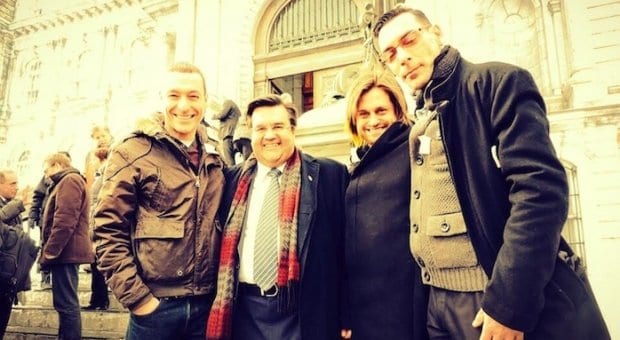Montreal police report that violent attacks in Montreal’s gay village dropped by 22 percent between 2012 and 2013, from 92 to 73. But local LGBT activists claim the numbers are low and misleading because many victims are not reporting late-night attacks to police.
Police and LGBT activists also believe that many attacks involve drug dealers and their clienteles.
“Just during the week of Jan 10 to 17, there were six attacks in Montreal’s gay village, and only three victims filed police reports,” says Louis-Alain Robitaille, spokesperson and founder of the Collectif Carré Rose Montréal, whose mandate is to fight homophobia and promote safety and security in the Village.
As first reported in Xtra in December 2011, homophobic and violent incidents have been on the rise in Montreal’s Village since the spring of 2011. Then in April 2012, Montreal activists and business owners launched the J’Aime Mon Village publicity campaign to help raise awareness and safety in the Village while encouraging victims and witnesses to report all criminal acts to police. Two months later, Montreal-based Gai Écoute launched its Acts of Homophobia Registry (AHR).
But the wave of violence continued until the Collectif Carré Rose Montréal was formed in December 2013, when five men and women attacked local DJ Alain Jackinsky when he left Sky Bar on Ste-Catherine Street. (Full disclosure: This reporter attended the group’s founding meeting.)
The organizing committee has since met with local business owners, Montreal police and representatives from the City of Montreal. The city agreed to add 14 police officers to monitor crowds on weekends as Village bars close. “We applied pressure to have more police patrols on Ste-Catherine Street in the Village from midnight to 4am, and what we got are more police patrols on Friday, Saturday and Sunday mornings from 2 to 4am,” Robitaille says. “It’s only two hours a day, but the patrols are working: we haven’t had any assaults in the gay village for four weekends in a row now, following that week-long period when we had six attacks.”
But the City of Montreal wants to go further and introduce surveillance cameras not just in the Village, but also throughout downtown. Montreal already operates some 2,200 cameras throughout the city to monitor the Metro subway system and social housing developments.
“I want to launch a debate on this — do we need camera surveillance or no?” Mayor Denis Coderre recently told reporters. “I think we need more video surveillance, but I want to make sure there is a legal framework so we can protect personal information.”
The Quebec Human Rights Commission opposes video surveillance, fearing cameras will hinder several rights guaranteed under Quebec’s Human Rights Charter. But Robitaille says video surveillance in the Village will allow police to identify attackers. “I don’t think it will stop the perpetrators, but cameras will provide proof and identification [of the attackers]. If people file a police report, only then will photos from the video surveillance be retrieved.”
Robitaille believes video surveillance will also encourage attack victims to file police reports. “Police publicly say the number of violent attacks in the gay village dropped between 2012 and 2013, but the discrepancy between what they report and what’s really happening on the street is because many LGBT victims are not reporting attacks to the police. Adding to the sense of futility, of all the police reports made in the past year, police only brought one perpetrator to justice.”
Robitaille says victims are also usually attacked from behind, which means they can’t identify their attackers — one reason many don’t file police reports. “They get home all bloodied, in shock, and tell themselves, ‘I can’t make a police report because I don’t even know who attacked me,’” he says.
The city says the extra security in the Village is slated to remain indefinitely, but police will reassess the situation over the coming weeks.
Meanwhile, the Collectif Carré Rose Montréal has organized an anti-violence march to take place in the Village on Feb 14. The march will begin in front of Cabaret Mado and head east along Ste-Catherine Street to Papineau Street. More than 3,700 people have “liked” the Collectif Carré Rose Montréal’s Facebook page, and more than 500 people are expected to attend the march.
“The anti-violence march is our way to publicly reclaim the Village, show solidarity and remind the LGBT community that our Village can be a safe space,” Robitaille says. “This will be a festive demonstration escorted by the police who — like local business owners — have been very accommodating, working with us to help stop crime in the Village.”
If attacked, you can file an anonymous report with Montreal police.
You can also file an anonymous report with Gai Écoute’s Acts of Homophobia Registry.
Montreal: 514-866-0103
Rest of Quebec: 1-888-505-1010
Collectif Carré Rose Montréal on Facebook
Facebook event page for the Feb 14 anti-violence march


 Why you can trust Xtra
Why you can trust Xtra


